Nexus 7 sells out
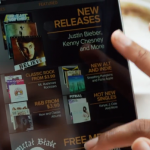
Google's tablet is off to a rousing debut. I doubt sales numbers will reach iPad standards, but Nexus 7 is nevertheless hotly pursued and reports from early adopters evoke pure delight. If you want one and haven't ordered, be prepared to wait. In the United States, delay is now nominal for the 8GB model -- 3 to 5 business days before shipping, according to Google Play. Prepare to wait three to four weeks for the 16GB tablet, however. That's from Google, which right now has best availablity following the first weekend rush.
I preordered one for my wife on June 29, hours after returning from Google I/O. Soon as she saw my Nexus 7, Kindle Fire was history. Shipment notice dispatched while I was at Comic-Con on July 14, and the tablet arrived early afternoon yesterday. I watched a fairly consistent stream of Google+ posts all day, as those people who preordered received their tablets.
Samsung Galaxy Note comes to T-Mobile

Let’s assume you’re a big fan of the Samsung Galaxy Note and you want one, but you reside in the United States and your carrier happens to be T-Mobile. Well, take Note! T-Mobile has officially confirmed that it is coming online and to select stores. Phablet fans, rejoice.
There are no details on pricing or when it’s going to be officially available at the US carrier, but what we do know are the juicy details on specifications. You’re still getting that huge 5.3 inch AMOLED display, 8-megapixel back-facing camera with 1080p video recording; 2MP front-facing camera with video recording; 1GB of RAM; and HSPA+ connectivity (42Mbps download is a nice selling point, even better than the international version), among other things. And the biggest news is that it will actually come with Android 4.0 Ice Cream Sandwich out of the box and Samsung Premium Suite preinstalled as well.
Comic-Con 2012: Android Collectibles artist Andrew Bell [video]

Android has one of the cutest and most-easily recognized mascots/brand figures around. But there's more to it than just being green. Dead Zebra produces a series of popular Android figure collectibles. Artist Andrew Bell started the company a dozen years ago and, sanctioned by Google, released the first Android designs in 2010. Bell and Co. created a special Comic-Con set, just 1,000 of them, for the event.
Dumbrella is one of my favorite Comic-Con booths. I stopped by on Day 1 to look at Android collectibles only to find myself behind four people each holding the Comic-Con set purchased at the other end of the hall. Bell worked the booth, and they wanted autographs. What luck, I bought the $25 two-Android set earlier in the afternoon. He signed mine, too, and agreed to an interview.
Jelly Bean gives clues to Google Glass future

Two weeks ago during I/O, Google made many announcements, with Android 4.1, or Jelly Bean, among them. But there was more: Nexus 7 tablet, media-streaming sphere, new Google+ features, some updates to the Google Maps app, and Glass, Google’s idea for "smartglasses".
All these different products may make Google seem scatter-brained, but I think Project Glass accounts for many of the Android updates. Glass is clearly important to Google. Cofounder Sergey Brin says that he spends about 50 percent of his time on Project Glass. Google also went way out on a limb last April when releasing this concept video for a product, when at the time, they said they had no plans for bringing Glass to production, and they still have no clear plan today.
Android Dropdialer Trojan poses as games on Google Play
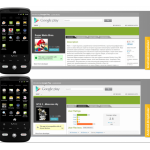
It’s a new day, but not quite so new malware on Google Play. Symantec caught a Trojan posing as game titles Super Mario Bros and GTA 3 Moscow City on the Android app store. Uh-oh, they had been up on the market since June 24, infiltrating somewhere between 50,000 – 100,000 smart phones, says Symantec's Irfan Asrar. "We would like to thank Android Security for immediately revoking the threat after we notified them of this discovery".
Both of the game apps are the Trojan known as Dropdialer. Once it gains access to a phone, the Trojan pulls in another package called Activator.apk through Dropbox. Then it goes ahead and wreaks havoc by sending texts to premium-rate text numbers. "The premium SMS is targeting Eastern Europe", Asrar says. Then, in the most subtle manner, the malware gets rid of the secondary payload by effectively removing all traces of what it has been doing.
Starbucks Android app finally arrives in the UK and Canada

Android-owning coffee addicts living in United Kingdom and Canada can, from today, start paying for their brewed beverages and food using a new Starbucks app. Once installed, all you have to do is link it to an existing Starbucks card and order some drinks. The app will display a barcode for the barista to scan, resulting in the total being automatically debited from the linked card.
You can use the app to add some credit (using a credit card or PayPal account), check your balance, view your previous transactions, and track Stars in the My Starbucks Rewards program. You can also transfer credit between cards if you’re running low and a friend is happy to help. If you’re not sure where the nearest Starbucks is, the app will show you on a map. If you lose your phone, or have it stolen, all you need to do is cancel your Starbucks card and that will prevent the finder/thief from enjoying a Venti Doubleshot Caramel Macchiato, or similar, at your expense.
Google releases Android 4.1 Jelly Bean
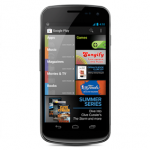
Early this evening, EDT, Google started dispatching Jelly Bean to Galaxy Nexus HSPA+. Phone sales also resumed at Google Play, for $349 -- or $50 less than what I paid about two months ago. At Google+, Brian Medeiros asks the right question: "Who else is hitting the 'Check Now' on their Galaxy Nexus non-stop to get the Jelly Bean?" I did on my phone and my wife's. No enchilada.
Google's Nexus Google+ account posted at 7:07 pm: "The rollout of Android 4.1, Jelly Bean, begins today, starting with Galaxy Nexus HSPA+ devices...If you’ve got a Galaxy Nexus HSPA+ device, you will receive a prompt alerting you to the update over the next several days". Please folks, don't become hamsters in the wheel constantly pressing "Check Now".
Piracy is killing Android

It sounds like a silly question. After all, Android is more popular than ever, with new “hero” phones and tablets arriving almost every week. However, for all of the platform’s success, there’s one aspect that remains a lingering blight on Google’s otherwise shiny success story: Software piracy.
Simply put, the rampant piracy of apps on “rooted” Android devices is killing developer momentum, with many devs resorting to unpopular and often intrusive in-app advertising and other gimmicks to make up for the gap in traditional Google Play revenue. And with the Android enthusiast community seemingly obsessed with “rooting” every new device that comes to market -- thus making it easier for unscrupulous users to pirate apps and/or bypass normal app security mechanisms -- the problem only gets worse.
ZING! Galaxy Note gets Android 4.0 and awesome new features, but there's a catch...

Last April, Samsung released the list of its smartphones and tablets that would receive an upgrade to Android 4.0. The list included the polarizing, is-this-phone-too-big-to-be-a-phone, Galaxy Note.
This update would normally be unremarkable, especially since Google yesterday released the AOSP version of Jelly Bean, but because the Galaxy Note is stylus-friendly, the update includes some feature upgrades to the Galaxy Note's S Pen peripheral in the form of the "Premium Suite."
Google open sources Android 4.1 Jelly Bean

Google has released the latest and greatest version of its Android mobile operating system, known as Jelly Bean, or Android 4.1 into the open source channel on Monday afternoon.
An announcement from Jean-Baptiste Queru, Google's head of the Android Open Source Project, officially opened availability of the Jelly Bean binaries Monday. Generally speaking, open sourcing is the very first step in broad availability for the newest build of Android, as this is the framework phonemakers use to build their respective versions of the operating system.
New Android malware threat: over 100,000 devices infected so far

Malware on Android devices is a real and growing threat, and one that is only likely to worsen. The latest Trojan to be found in the wild is a particularly nasty piece of coding named MMarketPay.A by TrustGo, the mobile security company that discovered it. Believed to have infected more than 100,000 smartphones in China, the Trojan downloads paid apps and videos from Mobile Market (M-Market), China Mobile’s official app store, without the user’s knowledge, resulting in some pretty hefty bills.
The malware is picked up by downloading infected apps from one of nine app stores (nDuoa, GFan, AppChina, LIQU, ANFONE, Soft.3g.cn, TalkPhone, 159.com and AZ4SD) and once installed on a device, it bypasses M-Market’s SMS security step, and begins placing orders and downloading content.
Someone save us from these huge Android smartphones
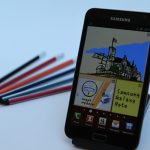
One thing that I can’t seem to get to grips with: The way manufacturers think we all have the hands of a basketball player. I’m not joking, as I’m not there yet. Look at all the new smartphones -- they are all bigger than before. It begs the question: when is enough enough?
I’m going to say it now, so I can get it over with: I don’t like big phones. I’m a guy, and I love a great display as much as the next person. But I can’t seem to love big phones. To me, a smartphone should work as a phone in the first place and as a smartphone second. I do make plenty of calls each day, and I place much value on the size of the device; it needs to fit comfortably in my pocket.
HTC can blame themselves for weak financial results

HTC is one of the most important players in the Android world, delivering some of the best smartphones on the market today. In order to improve, HTC UK chief Phil Robertson said that for 2012 they will change their strategy to release only high-quality handsets rather than focus on a high number of devices. That sounded like a great idea at the time and one that was also reinforced by the CEO, Peter Chou. But does it match HTC's recent financial results?
HTC has seen rather disappointing financial results for the second quarter of 2012, the company posting a net income, after taxes of T$7.4 billion ($247.7 million). The profits increased by 65.5 percent over the previous quarter, up from T$4.47 billion ($149 million). Revenues were up as well from the first to the second quarter, from T$67.79 billion ($2.26 billion) to T$91.0 ($3.04 billion), a 34.2 percent increase.
Android botnets? Not so, says Google

A couple of days ago Microsoft researcher Terry Zink claimed he’d uncovered evidence of Android phones being used as part of a botnet to send spam from Yahoo Mail servers. In his blog post on July 3rd he reported that the spam, which included "androidMobile" in the message header, and "Sent from Yahoo! Mail on Android" at the bottom of the emails, was being sent from devices located in Chile, Indonesia, Lebanon, Oman, Philippines, Russia, Saudi Arabia, Thailand, Ukraine and Venezuela. He then went on to speculate that users of the infected phones might have installed Trojanized pirated versions of legitimate apps, and become infected that way.
Security experts Sophos, agreed with his findings after running investigations of its own on the spam messages, but didn’t actually find or test any of the supposed malware itself. Google has since denied that any Android devices have been compromised in this way, stating there was no evidence to prove Zink’s claim, and that the junk messages had just been formatted to look as if they originated on Android handsets.
Archos unveils new 9.7 inch mass market Android tablet
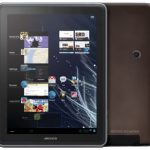
French consumer electronics company Archos on Thursday unveiled the first product in its upcoming "Elements" line of Android tablets, the Archos 97 Carbon.
Archos took its expertise in media and entertainment products and defly applied it to Android tablets three years ago. The result has been a series of enthusiast-level tablets with some totally unique and attractive features. For example, the Archos Stick was a removable USB modem built into the back of the company's Android tablets which could be popped out and used in a PC when it wasn't being used for the tablet's data connection.
Recent Headlines
© 1998-2025 BetaNews, Inc. All Rights Reserved. Privacy Policy - Cookie Policy.